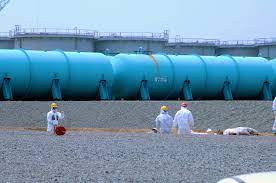The International Atomic Energy Agency (IAEA) recently confirmed that Japan is conducting precise and consistent monitoring of occupational radiation exposure for workers handling ALPS-treated water at the Fukushima Daiichi Nuclear Power Station (FDNPS). The findings stem from a comprehensive two-year Interlaboratory Comparison (ILC) programme requested by Japan to assess Tokyo Electric Power Company’s (TEPCO) radiation monitoring and ensure adherence to international safety standards.
Key Findings of the ILC Programme
The ILC program, conducted jointly by IAEA technical service labs in Vienna and partner labs in Japan, assessed the quality and accuracy of TEPCO’s dosimetry services, focusing on whole-body, extremity, and eye-lens dosimeter monitoring. Additional support came from reference laboratories in Germany and Spain, which provided calibration standards for varied radiation types. The results of the study highlight TEPCO’s commitment to high-quality monitoring systems that accurately measure worker exposure levels, meeting the stringent requirements of IAEA’s Safety Standards.
IAEA Director General Rafael Mariano Grossi emphasized the importance of maintaining rigorous safety measures at FDNPS, noting that the IAEA’s verification work is central to providing transparency and upholding safety at the site.
Background on ALPS-Treated Water and Worker Safety
TEPCO’s work with the Advanced Liquid Processing System (ALPS) is central to managing contaminated water stored at FDNPS since the 2011 disaster. ALPS technology removes most radionuclides from the water, although some trace elements remain, making rigorous radiation monitoring essential for worker safety. Since Japan began its phased release of ALPS-treated water into the Pacific in August 2023, monitoring practices for both environmental and worker safety have remained a global concern. Japan has continued to collaborate with the IAEA and various international stakeholders to ensure its processes meet international standards.
Future Steps and the Role of IAEA
Beyond dosimeter monitoring, the IAEA has pledged to continue assessments of TEPCO’s monitoring systems and will conduct periodic reviews to ensure sustained compliance. Additionally, the agency is overseeing the safety of the ALPS-treated water discharge into the Pacific Ocean, as part of its role in providing comprehensive, third-party evaluations of the environmental and health impacts of Japan’s disposal approach.
The IAEA’s recent findings provide an additional layer of transparency, affirming Japan’s commitment to safety and its compliance with global radiation safety standards. This ongoing international collaboration ensures the Fukushima Daiichi site remains safe for workers and underscores the effectiveness of Japan’s efforts to manage long-term radiation risks effectively.











